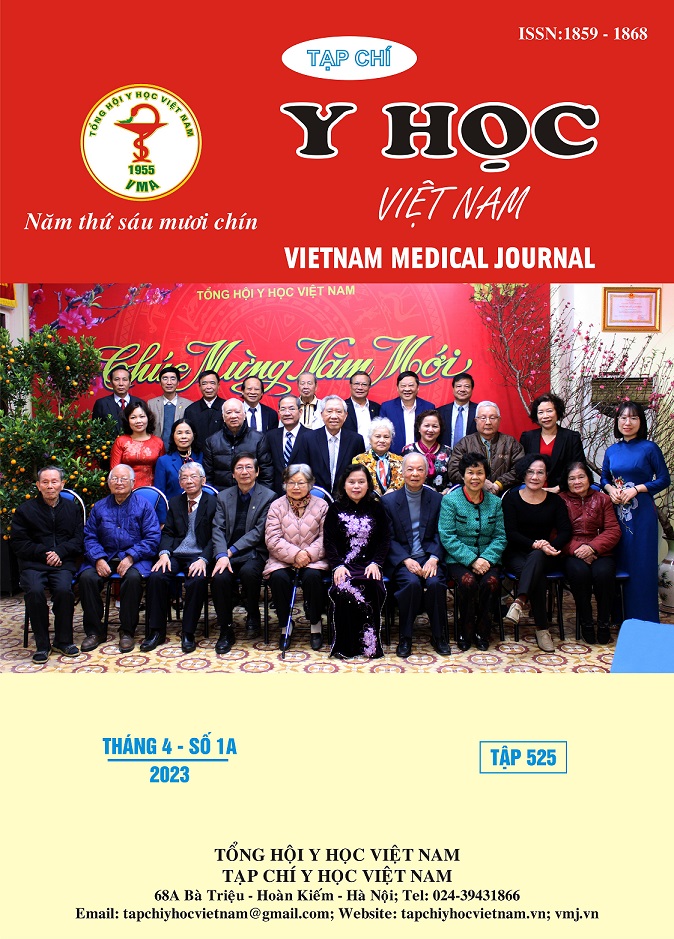RESULTS LAPAROSCOPIC SURGERY FOR RECTAL CANCER AT THAI BINH PROVINCIAL GENERAL HOSPITAL
Main Article Content
Abstract
Objective: Evaluate results of laparoscopic surgery using a circular stapler for the treatment of rectal cancer at Thai Binh Provincial General Hospital. Subjects and Methods: This is a prospective descriptive study on a group of patients that were diagnosed with rectal cancer and were treated with laparoscopic colorectal resection and lymphadenectomy at General Surgery Department of Thai Binh Provincial General Hospital over the course of 2 years, from January 2021 to November 2022. Results: The total number of eligible patients involved in the study was 30, including 17 males and 13 females. The mean age of this demographic was 65.07 ± 11.2 years. 96.7% of patients had normal weight (BMI < 25). The average operative time was 157.0 ± 25.6 minutes. Intraoperative complications were seen in 2 patients (6.6%), who had a slight damage to the serosa and muscle layers of the left colon. In 100% cases, colorectal anastomosis was made end-to-end with 28 mm EEA circular staplers. The return of bowel function was in an average of 47.2 ± 7.0 hours after surgery. The average number of harvested lymph nodes was 11.0 ± 3.6. Postoperative complications included: anastomosis leakage - 1 case (3.3%), surgical site infection – 2 cases (6.6%). Postoperative oral feeding began in 59.8 ± 15.9 hours after surgery. Postoperative complication rate was 30 %, of which the majority were minor and cured noninvasively. The mean length of postoperative hospital stay was 10.5 ± 2.8 days and there was no death reported within the postoperative period. Conclusion: Laparoscopic surgery for rectal cancer at Thai Binh General Hospital is a safe method with low rate of intraoperative and postoperative complications.
Article Details
Keywords
Laparoscopic surgery for rectal cancer, rectal cancer
References
2. Heald, R.J., E.M. Husband, and R.D. Ryall, The mesorectum in rectal cancer surgery--the clue to pelvic recurrence? Br J Surg, 1982. 69(10): p. 613-6.
3. Hida, K., et al., Open versus Laparoscopic Surgery for Advanced Low Rectal Cancer: A Large, Multicenter, Propensity Score Matched Cohort Study in Japan. Ann Surg, 2018. 268(2): p. 318-324.
4. Yang, H., et al., Influence of tumor location on short- and long-term outcomes after laparoscopic surgery for rectal cancer: a propensity score matched cohort study. BMC Cancer, 2020. 20(1): p. 761.
5. Schnitzbauer, V., et al., Laparoscopic and open surgery in rectal cancer patients in Germany: short and long-term results of a large 10-year population-based cohort. Surg Endosc, 2020. 34(3): p. 1132-1141.
6. Otsuka, K., et al., Laparoscopic Low Anterior Resection with Two Planned Stapler Fires. JSLS, 2019. 23(1).
7. Mu, Y., et al., The efficacy of ileostomy after laparoscopic rectal cancer surgery: a meta-analysis. World J Surg Oncol, 2021. 19(1): p. 318.
8. Zhang, Q., et al., Outcomes of Laparoscopic Versus Open Surgery in Elderly Patients with Rectal Cancer. Asian Pac J Cancer Prev, 2021. 22(4): p. 1325-1329.


